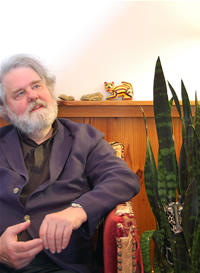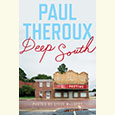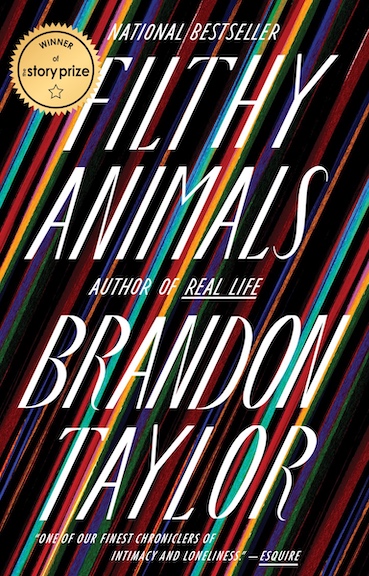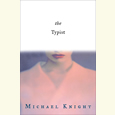Entranced
Coleman Barks talks about his thirty-year fascination with the Sufi poet Rumi
In 1976, Chattanooga native Coleman Barks was an established poet with a published collection of his own (The Juice) to his credit when poet Robert Bly introduced him to the work of Mowlana Jalaluddin Rumi. At the time, Rumi, a thirteenth-century Sufi poet who is a literary and spiritual icon in the Persian-speaking world, was little-known in the West. Bly told Barks that Rumi’s poems “need to be released from their cages”—a task that Barks has now pursued for more than thirty years. Working from English translations, Barks, who does not read Persian, has opened the world of Rumi to Westerners. His interpretations convey the mystical insight of the poems in free verse that appeals to a broad audience. Barks has a particular gift for capturing the ecstatic spirituality that is the core of Rumi’s wisdom.
There is some kiss we want with
our whole lives, the touch of
spirit on the body. Seawater
begs the pearl to break its shell.
 Through bestselling books like The Essential Rumi (1995), Barks’s efforts have contributed enormously to Rumi’s current popularity in the United States. Religious studies scholar Huston Smith has said, “If Rumi is the most-read poet in America today, Coleman Barks is in good part responsible.”
Through bestselling books like The Essential Rumi (1995), Barks’s efforts have contributed enormously to Rumi’s current popularity in the United States. Religious studies scholar Huston Smith has said, “If Rumi is the most-read poet in America today, Coleman Barks is in good part responsible.”
Barks taught literature at the University of Georgia for thirty years, and he has continued to publish highly regarded poetry of his own, including book-length collections Gourd Seed (1993) and Tentmaking (2002). In 2008, the University of Georgia Press published a retrospective collection of Barks’s work, Winter Sky: New and Selected Poems, 1968-2008. Prior to his visit to Austin Peay State University on March 4, Barks spoke with Chapter 16 about why so many contemporary American readers are entranced with an ancient Persian poet.
Chapter 16: You’ve been working with Rumi’s poetry for three decades. Does your understanding of it continue to evolve? Has there ever been a period when you wanted to put Rumi aside, when you felt you were finished with him?
Barks: I have never gotten tired of this Rumi work. I may be a little simpleminded in this area, entranced. The poetry keeps unfolding, revealing itself, and exploring that part of the psyche that is beyond mind and emotions, the unnameable mystery. The soul, the heart, the core, the conversation, the silence, the oceanic self, the tao. It has been called many different things. Rumi’s myriad ways of saying, and not-saying, who and where we are has remained interesting over the last thirty-four years. His sense of what is beautiful in words and images and story keeps its appeal for me.
Chapter 16: Rumi’s poems originated with the spoken word, and you have often performed your translations. Do you think of it as primarily oral poetry?
Barks: Rumi’s poetry was spoken spontaneously and taken down by scribes. Evidently he then did some revising of those copies. We don’t know how much. But yes, the poetry is oral, meant to be resonated by a human voice with music alongside to help the words go deeper. As the great Afro-American poet, Etheridge Knight, liked to say, spoken poetry is not a casual thing. It goes from deep self to deep self, and that resonance can wake up our souls, if we let it.
Chapter 16: How important is it to understand Rumi as a historical figure in order to appreciate the poems?
Barks: My emphasis is not on his historical context, the Persian empire in the thirteenth century, or the Roman-influenced part of Central Anatolia. I let others do that. I try to let him come across as a universalist, planetary poet. Not primarily Persian or Turkish, or Islamic. He is one of those in the history of religions who blurs boundaries, national and religious. His poetry is for everyone. People from all religions came to his funeral. When asked why, they said, ‘He deepens us wherever we are.’ He felt the longing that is at the core of every religious impulse, and his poetry comes from there. The love religion is beyond all doctrines and bureaucracies, all churches and armies, and all politics.
Chapter 16: Do you think any serious student of Rumi has to consider his relationship with Shams Tabriz?
Barks: Shams Tabriz is the central mystery of Rumi’s poetry. Their friendship is the energetic source of the poems. Rumi calls his huge collection of odes and quatrains, The Works of Shams Tabriz. Shams means “the sun.” Whenever sunlight is mentioned in the poems, it also means the mysterious presence, or essence, of Shams Tabriz, a specific person, and also a wider, invisible, presence.
Chapter 16: Is there something fundamentally subversive about the ecstatic vision of Rumi? Does the contemporary world have a place for the visionary?
Barks: Shams once said that if the kaaba were lifted up out of the world, that everyone would understand that what they were praying to, five times a day, was the sacred essence inside each other, acknowledging that, Namaste. That is a wildly revolutionary religious statement. Yes, I do think that Rumi’s poetry is subversive to the orthodoxies in his own time and in this contemporary world. Some new kind of love religion is coming forward now that embraces and celebrates all of the religions. We don’t know what form it will take, but we know it will not acknowledge any exclusivity (the last prophet, the chosen people, the only begotten—that kind of thing). “Love is the religion, and the universe is the book.” Your life is the sacred text you must read, the dream that must be interpreted.
Coleman Barks will give a reading and a talk—”The Mystery of Friendship: Rumi and Shams”—at 1:30 p.m., March 4, in the MMC Concert Hall on the Austin Peay State University campus. Barks will also join APSU faculty members Blas Falconer, Chris Burawa, and Bert Randall for a panel discussion, “Why Read Rumi?” at 3:30 p.m. in the African American Cultural Center. Both events are free and open to the public.





